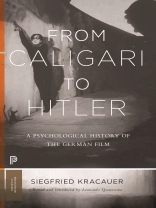An essential work of the cinematic history of the Weimar Republic by a leading figure of film criticism
First published in 1947, From Caligari to Hitler remains an undisputed landmark study of the rich cinematic history of the Weimar Republic. Prominent film critic Siegfried Kracauer examines German society from 1921 to 1933, in light of such movies as The Cabinet of Dr. Caligari, M, Metropolis, and The Blue Angel. He explores the connections among film aesthetics, the prevailing psychological state of Germans in the Weimar era, and the evolving social and political reality of the time. Kracauer makes a startling (and still controversial) claim: films as popular art provide insight into the unconscious motivations and fantasies of a nation.
With a critical introduction by Leonardo Quaresima which provides context for Kracauer’s scholarship and his contributions to film studies, this Princeton Classics edition makes an influential work available to new generations of cinema enthusiasts.
About the author
Siegfried Kracauer (1889–1966) was a film critic and independent sociologist and theorist. He is the author of
The Mass Ornament and
Theory of Film
(Princeton).
Leonardo Quaresima is professor of film history and criticism and director of cinema studies at the University of Udine.












